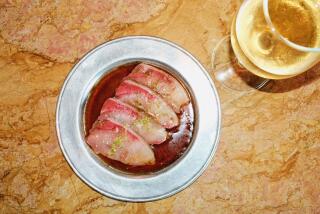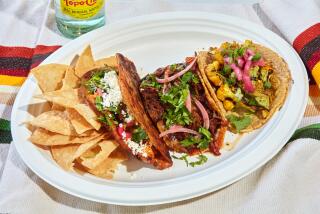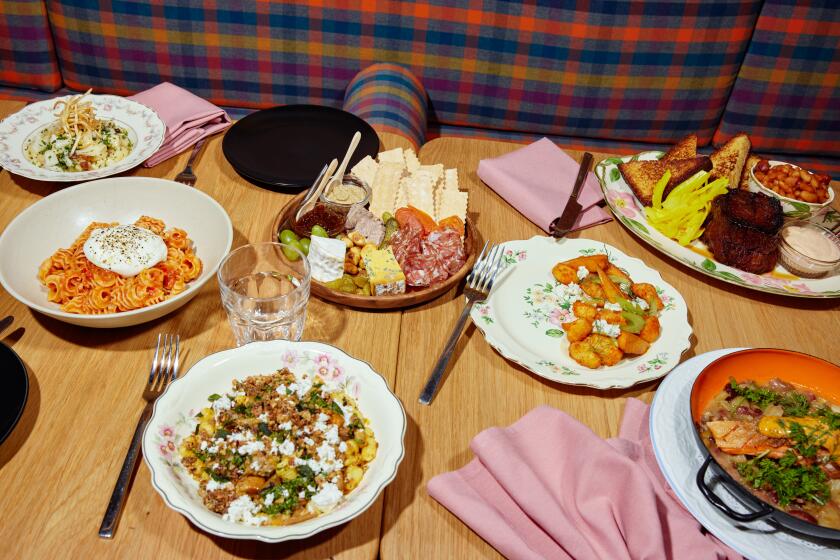An easy guide to pairing beer with barbecue
- Share via
From Carolina pulled pork to Texas-style beef ribs, Southern barbecue comprises many variations in the flavorful symphony of smoke, spice and fat. And craft beer’s diversity makes it an ideal accompaniment to whatever style of ’cue you’re into.
Beachwood BBQ and Brewing founder Gabriel Gordon has spent a lot of time obsessing over both barbecue and beer, and he says the many regional styles and intense flavors of wood-smoked meats allow for various approaches to pairings.
The golden rule of matching a beer with a dish is to consider the relative intensity of flavor between pint and plate. The more flavorful a dish’s ingredients and cooking techniques, the more assertive a beer needs to be to match. Barbecue is rarely subtle; the key notes get played loud. Even in simple preparations like a dry-rubbed brisket the chord of punchy black pepper and unctuous fat resonates on the palate. Whether it’s harmonizing or playing counterpoint with those flavors, a beer needs to be equally fortissimo. (Though this rule has exceptions as we’ll soon see.)
American stout
Gordon likes a complex brew, something well-hopped and featuring darkly roasted malts, as an all-purpose match for barbeque. An American stout such as Beachwood’s own Kilgore Stout fits the bill. Stouts feature barley malt roasted like coffee beans, and the flavors created in the process — chocolate, coffee and even smokey char — mirror many flavors present in barbecue. These “flavor bridges” create a pleasing harmony that can elevate both the food and the brew and even reveal subtle flavors in one (or both) that are easy to miss on their own.
West Coast IPA
A beer’s flavor can also interact with food in interesting ways, and beer’s inherent bitterness is a common example. Bitterness is powerful asset because it cuts through fatty richness and reinvigorates the palate. Barbecue can use brown sugar and molasses in rubs and sauces, and hop bitterness also pleasantly contrasts with this sweetness. The firm bitter finish of a West Coast IPA makes the style an easy fit with barbecue.
Mexican lager
Carbonation is another essential aspect of beer that provides a useful interaction with food: it literally scrubs lingering flavors off your palate. This is especially true with tongue-coating fats and persistent sweetness, the scrubbing bubbles effect of effervescence is powerful enough that even otherwise mildly flavored beers — like industrial light lagers — can be effective pairings for rich, sweet foods. Try a darker Mexican lager — Dos Equis Amber or Negra Modelo — with your next rack of ribs.
“Stay away from sweet beers!” Gordon implores. He says a sweet-on-sweet match mutes more subtle flavors found in both the beer and the meat. Smoke is another flavor that can become overpowering when it’s present in both the food and the beer, but Gordon does suggest if you’re a real lover of smoke flavors, a smoked beer (such as a traditional German rauchbier) can create some interesting interactions. Most smoked beers use malt that’s smoked over beechwood, which can actually contrast subtly with the oak and fruitwoods more commonly used in southern barbecue.
Sour beers
“You can use beer to fill-in elements missing in the dish,” Gordon says, creating balance where there are lopsided flavors. Gordon’s go-to beer styles for matching with barbecue are sours. Vinegar is a key ingredient in many barbecue sauces, and where wine pairings are challenged by vinegar, beer excels. Old world-style sour ales — Belgian lambics and Flanders red ales — often contain a touch of acetic acid, and this builds a flavor-bridge with vinegar-based barbecue sauces while the brighter lactic acid present in the beer helps balance the rich and umami-loaded meats.
Where to test out your beer and barbecue pairings
Barbecue is, after perhaps the cheeseburger or pizza, the American culinary tradition most closely linked with beer, and this means there are no shortage of local restaurants offering a wide selection of craft brews to go with their smoky ’cue. From Beachwood BBQ and Brewing in Long Beach, and its original location in Seal Beach, which both serve up the best of American craft beer alongside excellent house-brewed styles; to Rosie’s BBQ in Northridge whose limited tap list leans toward the up-and-coming breweries in the San Fernando Valley, there are many opportunities to explore how beer and barbecue are built for each other. Also try: Boneyard Bistro in Sherman Oaks, Barrel & Ashes in Studio City, Horse Thief Barbecue at Grand Central Market downtown, or find Bartz Barbeque, which often sets up at local taprooms (El Segundo Brewing Co. and Los Angeles Ale Works in Hawthorne are regular stops).
Barrel and Ashes — 11801 Ventura Blvd., Studio City, (818) 623-8883, barrelandashes.com.
Beachwood BBQ — 131 ½ Main St. Seal Beach, (562) 493-4500, beachwoodbbq.com.
Beachwood BBQ and Brewing — 210 E 3rd St., Long Beach, (562) 436-4020, beachwoodbbq.com.
Boneyard Bistro — 13539 Ventura Blvd., Sherman Oaks, (818) 906-7427, boneyardbistro.com.
Horse Thief BBQ — 324 S Hill St., Los Angeles, (213) 625-0341, www.horsethiefbbq.com.
Rosie’s BBQ — 8930 Corbin Ave., Northridge, (818) 349-3055, www.rosiesbbq.com.
ALSO:
Thanksgiving recipes from our food writers’ home kitchens
20 casserole recipes, perfect for fall and Thanksgiving planning
More to Read
Eat your way across L.A.
Get our weekly Tasting Notes newsletter for reviews, news and more.
You may occasionally receive promotional content from the Los Angeles Times.










